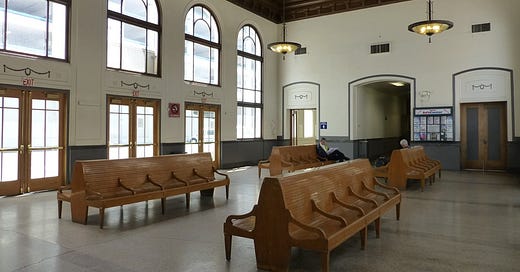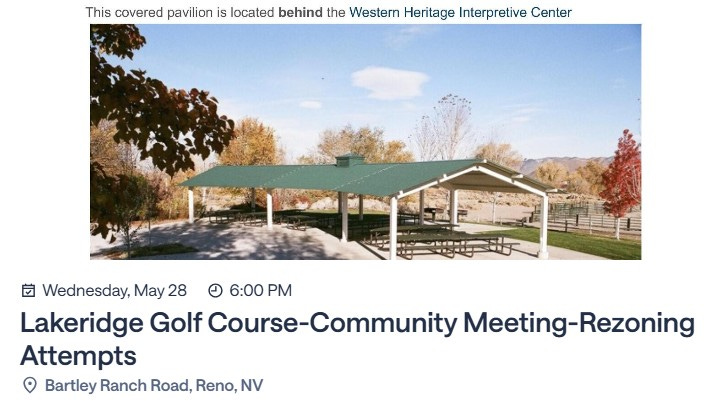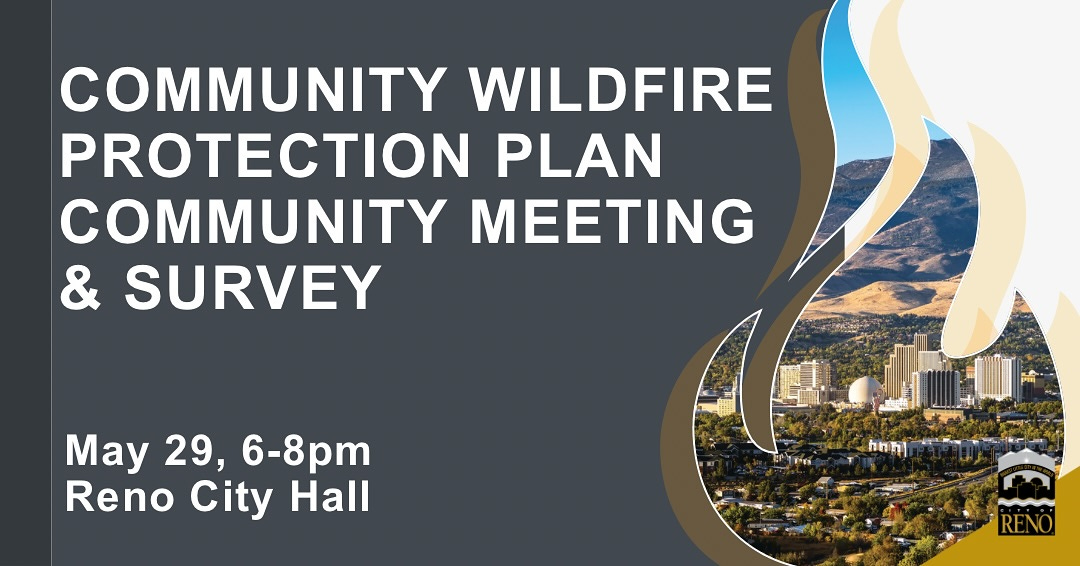Will land use planning and development be the central issue of the 2026 City of Reno elections?
I mull it over while providing a slew of recent updates and announcements.
I hope you all had a meaningful and enjoyable Memorial Day weekend. There are no scheduled meetings of City of Reno bodies this week, although the City is holding a meeting about its new Wildfire Protection Plan on Thursday. More on that below.
This week, I’ll be sharing updates from the May 21 Reno City Council meeting, a few announcements, and the latest news in local urban development. And I’m leaning heavily on the links this week with minimal commentary about most of these topics, so I hope you’ll take the time to read through all the articles, many of which offer a detailed look at the workings, behavior, and rhetoric of our current City Council.
Most of us aren’t able to watch entire Council meetings month after month, so we rely on attentive reporting to encapsulate the nature of Council deliberations and how those on the dais engage with the public and with one another. Thank you to all of the local reporters who are working so hard to provide us with a fuller picture.
I’ve lately been pondering how issues of land development and planning have grown to occupy such a central place in our local politics. Of course there are many other critical local issues, from the budget to public safety to homelessness to supporting small businesses, and I hope this will finally be a local election where we actually discuss candidates’ positions and (where relevant) voting records regarding all of them.
But land use planning—deciding what can and should be built, and where—pertains to all of those issues and more. It’s the subject that hits all of us literally where we live (and work and play), whether we’re talking about Accessory Dwelling Units (ADUs), data centers, digital signs, affordable housing, historic preservation, wild horses, parks and public spaces, infill, transportation, wildfire prevention, redevelopment, revitalization, and more. And there’s a lot of money at stake, too. A lot.
Land development will shape the landscape of Reno’s future. Do you like where things are headed? Now’s the time to start asking yourself that question. Nothing about development is predetermined, but once a course is set, it’s difficult to change.
Primary elections will take place in June of 2026, and although that’s a year away, our local races will be underway before you know it. So I want us all to prepare ourselves by paying even more close attention to what’s going on, what our representatives are saying and how they are voting, and documenting what you notice and think about it.
With Mayor Schieve and Ward 2 Councilmember Naomi Duerr termed out, we’ll be voting in a new Reno mayor and Ward 2 Councilmember in 2026, for sure. The other Council seat up for election will be in Ward 4, currently held by Meghan Ebert.
The four Councilmembers currently representing Ward 1 (Kathleen Taylor), Ward 3 (Miguel Martinez), Ward 5 (Devon Reese), and Ward 6 (Brandi Anderson) all won their seats in 2024, and their four-year terms all extend to 2028. But there’s news that at least one of them may run for a different office in 2026—on May 22, Councilmember Taylor announced on social media that she has “officially launched an exploratory campaign to evaluate a run for Mayor of Reno in 2026,” complete with a new website.
Education is power, so let’s make sure to continue to educate ourselves and each other about all the issues, to become the well-informed populace we need and deserve.
NOTE: The May 22 Reno Planning Commission meeting was cancelled for lack of a quorum, so we can anticipate seeing the agenda items from that one on a future meeting agenda.
Updates from the May 21 Reno City Council meeting
You can read the City of Reno’s official Meeting Highlights for the May 21 City Council meeting here. If you need a reminder of what these items were all about, you can access my May 19 preview of this meeting here.
And now to the media coverage.
Approval of the revised sign ordinance including digital signs
More digital signs expected in Reno after council’s approval of new ordinance (This is Reno, 5/27/25)
Public Art—who decides, who’s hired to create it, and for how much
Mayor rails against public art policy again (This is Reno, 5/26/25)
The Status of Fire Regionalization discussions
Ominous predictions: City council mulls fire regionalization effort again (This is Reno, 5/23/25)
Approval of the industrialization of the StoneGate development
StoneGate zoning change approved with expanded industrial space, less housing (RGJ, 5/22/25)
Reno council advances huge warehouse project in Cold Springs after pivot from residential (News4, 5/22/25)
Approval of the City Budget
Reno City Council approves $1.03 billion tentative budget for fiscal year 2025/2026 (2 News Nevada, 5/21/25)
What the City is doing regarding Community Engagement
Community engagement is the topic of the latest episode of the City podcast, “On the Agenda.” As the episode description states, “The City is embarking on an initiative to assess and propose methods to improve engagement locally with our community, but what spurred this? Cynthia Esparza, the Director of Community Engagement and Services, joins us to shed light on this endeavor. Tune in as we explore current ways to engage, including newsletters, social media, Reno Direct, and more!”
The podcast is available on multiple platforms including Spotify and Apple.
The episode also previews some of the items to be discussed by Reno City Council at their upcoming June 4 meeting, including these:
An annual performance evaluation for City Manager Jackie Bryant
A presentation providing an overview of the Reno Fire Department and Reno Police Department's overtime use
A presentation and potential direction to staff on short-term rental (STR) regulation
The agenda for the June 4 Reno City Council meeting hasn’t yet been posted, but when it is, you’ll be able to access it on the Current and Upcoming Meetings webpage.
Senate Bill 48 regarding Planning Commissions
Last week, an opinion piece by David Colborne was published in the Nevada Independent about SB 48, currently making its way through the state legislature:
OPINION: Northern Nevada’s voters deserve more control over city planning (David Colborne, Nevada Independent, 5/20/25)
You can read about the content and history of SB 48 from This is Reno here.
In his opinion piece, Colborne expresses surprise that a bill that would pave the way for City Councilmembers to replace planning commissioners at will should have received so much pushback, stating this:
"…it’s no surprise that city councilors fight for every chance to exercise some direct influence over the government they’re ostensibly supposed to be overseeing. And why not? Thousands of voters elected each of Reno’s city councilors. How many people attend most planning commission meetings? If we actually want community engagement in our cities to improve, we need to acknowledge that the primary way most residents hold their cities accountable is through the ballot box, not through public comment.”
As I explained on the Facebook page of the American Planning Association’s Nevada Chapter, I don’t disagree that ONE important aspect of holding our cities accountable is electing good candidates. But our engagement and oversight shouldn't be expected to end on Election Day. Accountability is an ongoing process, and it seems a huge leap to imply that voters are supposed to somehow anticipate how a City Council candidate, and therefore how his or her Planning Commission appointee—would vote on any future planning issue.
Colborne thinks that’s much more realistic than expecting planning commissioners to be responsive to the particular substance, context, and public sentiment regarding any individual decision that comes before them. I'd rather be confident that my city's appointed planning commissioners are knowledgeable about land use planning than expect them to follow the same political motivations as the councilmember who appoints them. I'd even be happy to see the introduction of requirements for planning commissioners to have actual experience with something related to land use planning before they're appointed (which is not the case today).
And just to be clear, the portion of this bill that received the most strenuous objection from three of Reno’s sitting planning commissioners was the part that would have replaced the current process governing the removal of commissioners (via public hearing for just cause) with the right to remove them at will. That section has been eliminated from the final draft, which now would primarily change the current law by making the terms of planning commissioners coterminous with those of the City Councilmembers who appointed them.
That would also make the Planning Commission more political than it is today, but would at least eliminate this bill's most egregious component.
NEWS DIGEST: The latest in local urban development
Downtown nightclub Two One Nine, formerly Eden, faces license suspension (This is Reno, 5/22/25)
Nevada Supreme Court upholds Neon Line District signs, rules Scenic Nevada lacks standing (This is Reno, 5/21/25)
National ‘pop-up hotel’ makes its Nevada debut in downtown Reno near the ballpark (RGJ, 5/23/25)
This is what Reno-Tahoe International Airport's new concourses will look like (RGJ, 5/22/25)
Former Reno city manager cleared in state ethics probe (This is Reno, 5/28/25)
I’ll likely have more to say on several of those topics in the future. But for now, I’ll just leave you with a few announcements…
May 28 at 6pm: Community-organized meeting to discuss the proposed rezoning of the Lakeridge Golf Course
Community members in the Lakeridge area have organized a community meeting to take place on Wednesday, May 28th at 6pm at the Plaza Pavilion at Bartley Ranch Regional Park. There, they plan to discuss Duncan Golf’s application to rezone 155 acres to Special Planning District (SPD) from Parks, Greenways, and Open Space (PGOS) and also the “hotel and spa” being proposed for part of the site. As the announcement on Nextdoor says, in part:
“We are gathering to discuss the facts and how we come together as a community. Help us spread the word, and please invite your neighbors. See you there.”
Many nearby residents recently received pink cards with the following information:
You can read about the applicant’s stated reasons for this rezoning request here:
Lakeridge Golf Course project looking to add boutique hotel, various amenities (RGJ 4/28/25)
Duncan Family announces plans for upgrades at Lakeridge Golf Course (Northern Nevada Business Weekly 5/9/25)
May 29 at 6pm: Community Wildfire Protection Plan Community Meeting
The City of Reno and the Reno Fire Department (RFD) are inviting residents to a community meeting to give input on an upcoming Community Wildfire Protection Plan (CWPP). The meeting is happening on Thursday, May 29, at 6 p.m. at Reno City Hall’s Council Chambers.
As the City explains, “A CWPP is a plan designed to identify and mitigate wildfire hazards to communities and infrastructure located in the wildland-urban interface (WUI). The CWPP makes recommendations for hazardous fuels reduction, public outreach and education, structural ignitability reduction, and fire response capacity.”
Whether or not you can attend the meeting, everyone is invited to take the short Wildfire Protection Plan (CWPP) Community Survey. All input will go to the planning team and the survey is open now until June 30, 2025. You can find more information and a link to the survey here.
May 29 at 12 noon: Walking Tour of Reno’s Historic Railroad Buildings
Join Architectural Historian Jean-Guy Dubé, State Office of Historic Preservation, and the City’s Arts & Culture department on Thursday, May 29 at 12 noon for a walking tour of Reno's historic railroad buildings. The approximately mile-long tour will begin with a look at the Interpretive Center inside the historic Southern Pacific Railroad Depot (aka the Amtrak Station) on East Commercial Row between University Way (Center Street) and Lake Street. Participants will walk to several nearby railroad buildings to learn how the railroad influenced Reno’s development.
The walking tour is free, but space is limited. Register here to secure your spot.
That’s all for today. Have a great week, stay cool and hydrated, and please look out for each other.
Be sure to check out my Citizen Guide for helpful resources and links to help anyone become more informed and engaged in issues related to urban development (& more) in Reno.
You can view this and prior newsletters on my Substack site, subscribe to receive each new edition in your email inbox, and follow the Brief (and contribute to the ongoing conversation) on X, Facebook & Instagram. If you feel inspired to contribute, you may purchase a paid subscription through Substack or contribute via Venmo at @Dr-Alicia-Barber or via check to Alicia Barber at P.O. Box 11955, Reno, NV 89510.









Hi! Colborne here. I appreciate your work and thoughtfulness. Your brief has certainly given me, and the rest of the community, a lot to think about through the years.
Regarding this part:
"I'd rather be confident that my city's appointed planning commissioners are knowledgeable about land use planning than expect them to follow the same political motivations as the councilmember who appoints them. I'd even be happy to see the introduction of requirements for planning commissioners to have actual experience with something related to land use planning before they're appointed (which is not the case today)."
I don't disagree, exactly. I just think that, if you want that, the most straightforward way to get it is to hire professional planners as staff and then review their work at the political level where voters are paying attention to it — which is basically what happens to planning commission recommendations anyway.
On a more fundamental level, I just personally think a lot of commissions at the local and state level are neither fish nor fowl — neither political nor technocratic, in other words — and I suspect a lot of voters don't realize how much responsibility has been devolved to groups that, despite the Brief, they may not know exist, much less how they operate, what responsibilities they have, or how they arrive at their decisions. Additionally, I don't think many people appreciate that, historically speaking, how intentional that disconnect was when it was first implemented.
I do wonder what happened to civil grand juries in Nevada, though. That's another rabbit hole I'll need to explore one of these days.